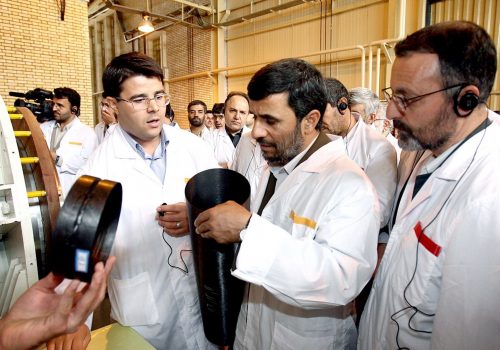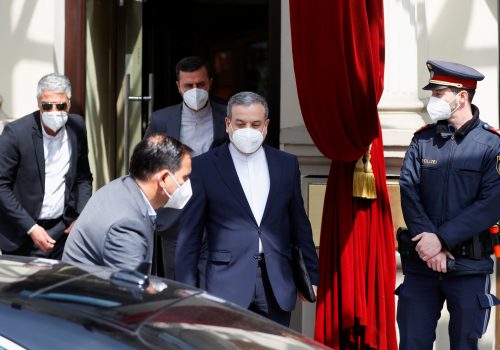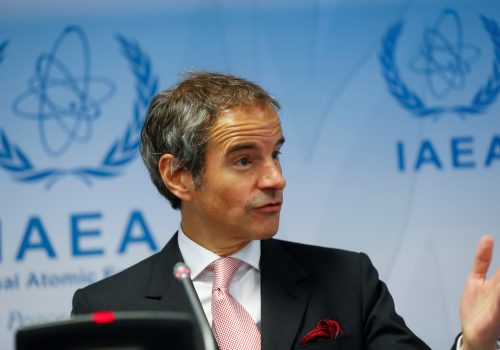The Raisi administration must answer the IAEA enquires. Otherwise, Vienna talks risk derailment.
All eyes will be on newly inaugurated Iranian President Ebrahim Raisi’s negotiating team when they return to Vienna to resume talks on restoring the 2015 nuclear deal. However, Raisi faces another challenge in Vienna—the country’s increasingly tenuous relationship with the International Atomic Energy Agency (IAEA). Tehran’s failure to fully cooperate with the IAEA’s investigation into past possible undeclared nuclear materials and activities risks derailing progress on the Joint Comprehensive Plan of Action’s (JCPOA) restoration and undermining confidence that Iran’s current nuclear program is peaceful.
Along with the Vienna talks, Raisi inherited the IAEA’s ongoing investigation into Iran’s pre-2003 nuclear program—an investigation that Tehran has stalled and drawn out over the past three years to the growing frustration of the nuclear watchdog. While Raisi has indicated that Tehran will return to talks on restoring the 2015 nuclear deal, he has not given any hint as to whether he will also prioritize cooperating with the IAEA. Momentum in the Vienna talks may spur Iran to address the IAEA’s questions, but progress during the first six rounds of negotiations earlier this year did not lead to greater cooperation with the agency. If Iran continues in this vein and stonewalls the IAEA’s inquiries, the investigation could disrupt the process to restore and sustain the deal.
While Iran’s failure to provide full and timely cooperation with the IAEA’s investigation is troubling and must be addressed, there is no indication in the IAEA’s public reports that the agency suspects such pre-2003 activities to be ongoing. Furthermore, the past work does not pose a near-term proliferation risk. Iran, however, as a member of the Nuclear Nonproliferation Treaty (NPT) is legally obligated to implement a safeguards agreement with the IAEA to provide assurance that its nuclear program is peaceful, irrespective of the JCPOA’s status.
The evidence presented by the IAEA to date suggests that Tehran failed to declare certain nuclear materials and activities from its pre-2003 program to the agency, as required by its safeguards agreement. Specifically, the IAEA identified four locations not part of Iran’s declared nuclear program where inspectors have evidence of uranium activities. After significant delays and initial denials, Iran granted inspectors access to one site in 2019 and three others in 2020. Environmental samples from three of the sites indicated the presence of processed uranium. The agency’s questions to Iran about the locations and uranium in 2020 and 2021 have gone unanswered since or deemed “not technically credible” by the agency, according to its most recent report on the investigation in May. The presence of uranium and Tehran’s failure to account for it makes it highly likely that Iran violated its safeguards obligations.
Tehran has argued that the IAEA’s investigation into its pre-2003 nuclear program was closed as part of the JCPOA and that the current line of questioning is politically motivated. Then Iranian Foreign Minister Mohammad Javad Zarif said in August 2020 after meeting with the IAEA that the inquiry was driven by those who want to “torpedo” Iran’s transparency by reopening “closed matters.”
Zarif was likely referring to one of the sources of the IAEA’s evidence, documents that Israeli intelligence agency Mossad stole from Iran in 2018. But this line of argument—that the IAEA cannot revisit Iran’s past activities and that its current efforts are politically motivated—does not hold water.
Under the JCPOA, Tehran was required to respond to IAEA inquiries about the illicit nuclear activities that violated its safeguards and NPT commitment to a peaceful nuclear program. The agency published a report in December 2015 concluding that Tehran had an organized nuclear weapons program through 2003 and that some activities continued until 2009, but that there was no evidence of nuclear weapons work since that time.
The 2015 report closed the IAEA’s open investigation, but the agency is still required to follow up on information suggesting that a country is not in compliance with its safeguards agreement. New information made available to the IAEA—partly from the stolen documents—pointed to the existence of nuclear materials that Tehran should have declared to the agency. The IAEA is obligated to evaluate that information and, if the evidence is credible, investigate whether Iran’s nuclear materials are accounted for and for peaceful purposes. This is also necessary to preserve the integrity of the safeguards system. Failure to follow up would have cast doubt on the agency’s ability to do its job. It is also in Iran’s interest for the IAEA to investigate. Stonewalling the agency only fuels speculation that Tehran has something to hide.
While this investigation is about past activities that ended long before the JCPOA was negotiated, it could still threaten efforts to restore the nuclear deal. The IAEA is clearly growing impatient with Tehran’s continued refusal to provide adequate answers to the agency’s investigation. IAEA Director General Rafeal Mariano Grossi warned at the last agency board meeting in June that the lack of progress toward resolving these issues “seriously affects the ability of the agency to provide assurance of the peaceful nature of Iran’s nuclear program.”
Grossi’s concern over the stalled process may spur IAEA member states to act at the agency’s upcoming Board of Governors meeting in September and push forth a resolution calling on Tehran to cooperate with the agency’s investigation. The thirty-five-member board, which comprises of IAEA member states, took similar action last year and appeared to produce results. In June 2020, the Board of Governors passed a resolution calling on Iran to “fully cooperate” with the IAEA “without any further delay” by providing access to locations specified by the agency. Two months later, Iran and the IAEA negotiated access to the three locations mentioned above so that inspectors could test for traces of uranium.
Earlier this year, ahead of the February Board of Governors meeting, France, Germany, and the United Kingdom considered introducing another resolution on Iran that included language calling on Tehran to cooperate with the agency’s investigation fully. They ultimately decided not to pursue a resolution to preserve space for talks restoring the JCPOA, but voiced concern over Iran’s failure to fully cooperate.
The Board of Governors may hold off on such a resolution at the September board meeting to give Raisi’s new administration time to engage with the IAEA, but time is not on Tehran’s side. If there is no progress, it would not be surprising if the states press forward with a resolution calling on Iran to cooperate before the end of the year. If a resolution does not produce results, the board could refer Iran to the United Nations Security Council (UNSC), as it did in 2006 when Tehran repeatedly refused to comply with IAEA requests for information about undeclared nuclear activities.
It is unclear whether the UNSC would act in the event of a board referral. When the IAEA reported Iran to the UNSC in 2006, it ultimately led to resolutions requiring Tehran to halt nuclear activities and imposed sanctions on the country. However, a single veto would block any Security Council action and Russia and China may be unwilling to subject Tehran to sanctions at this point. However, other states may reconsider sanctions against Iran and, politically, restoration of the JCPOA may be more challenging if Tehran was referred to the UNSC for failing to comply with its NPT safeguards obligations.
These implications for the JCPOA and the importance of preserving the broader integrity of the safeguards regime demonstrate the critical importance of Iran’s timely and full cooperation with the IAEA’s investigation. If the Raisi government can get off on the right foot and make progress with the IAEA, it could also help garner momentum in talks to restoring the JCPOA and quell speculation that Tehran is hiding something. It behooves the newly inaugurated Raisi government to prioritize setting a date to resume talks with the IAEA over the agency’s investigation. Agreeing on a timeframe to fully respond to the IAEA’s questions and following through in a timely fashion will send a message to the IAEA, the United States, and P4+1—Britain, China, France, Germany, Russia—negotiators that Tehran is serious is about meeting its international nuclear obligations.
If the issue is not resolved bilaterally between the IAEA and Iran, the US, P4+1, and Tehran should consider folding a timeframe for Iran to address the agency’s questions into any plan to restore the JCPOA. If the deal is restored without the IAEA’s investigation being addressed and Iran continues to stymie the agency’s inquiries, it risks undermining the accord and fueling speculation about the nature of Tehran’s nuclear program.
Kelsey Davenport is the director for nonproliferation policy at the Arms Control Association. Follow her on Twitter: @KelseyDav.
Image: European External Action Service (EEAS) Deputy Secretary General Enrique Mora and Iranian Deputy at Ministry of Foreign Affairs Abbas Araghchi wait for the start of talks on reviving the 2015 Iran nuclear deal in Vienna, Austria June 20, 2021. EU Delegation in Vienna/Handout via REUTERS


